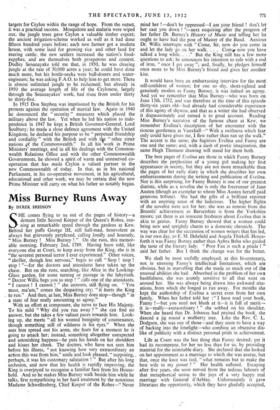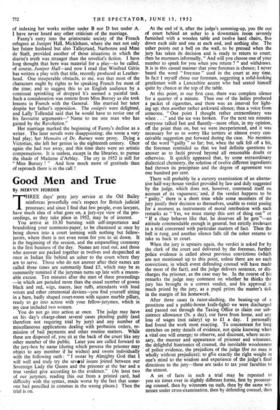Miss Burney Runs Away
By DEREK HUDSON
S-HE comes flying to us out of the pages of history—a demure little Second Keeper of the Queen's Robes, run- ning at remarkable speed through the gardens at Kew. Behind her puffs George III, still half-mad, benevolent as always but grievously perplexed, calling loudly and hoarsely, "Miss Burney ! Miss Burney ! " On she runs, this memor- able morning, February 2nd,- 1789. Having been told, like everyone else at Court, to keep away from the King, she is in "the severest personal terror I ever experienced." Other voices, "shriller, though less nervous," begin to call "Stop ! stop I stop ! "—for the doctors and attendants have taken up the chase. BM on she runs, searching, like Alice in the Looking- Glass garden, for some turning or passage in the labyrinth. "Doctor Willis begs you to stop ! "calls one of the attendants. "I cannot ! I cannot ! " she answers, still flying on. "You must, ma'am," comes the despairing cry; "it hurts the King to run." And then, at last, Miss Burney does stop—though "in a state of fear really amounting to agony."
With an effort at composure, she turns to face His Majesty. To his mild "Why did you run away ? " she can find no answer, but she takes a few valiant paces towards him. Look- ing up, she meets ",all his wonted benignity of countenance, though something still of wildness in his eyes." When she sees him spread out his arms, she fears for a moment he is going to attack her; instead, something altogether unexpected and astonishing happens—he puts his hands on her shoulders and kisses her cheek. The doctors, who have not seen him before his illness, "not knowing how very extraordinary an action this was from him," smile and look pleased, " supposing.. perhaps, it was his customary salutation ! But after his long seclusion, and now that his health is rapidly improving, the King is overjoyed to recognise a familiar face from his House- hold. And so he makes Miss Burney walk beside him while he talks, first sympathising in her hard treatment by the notorious Madame SchWellenberg, Chief Keeper of the Robes—" Never mind her I—don't be oppressed—I am your friend ! don't let her cast you down ! "—next enquiring after the progress of her father Dr. Burney's History of Music and telling her he ought to have had the post of Master of the Band. Anxious Dr. Willis interrupts with "Come, Sir, now do you come in and let the lady go on her walk. . . . Como now you have talked a long while. . . ." But the King still has a few more questions to ask; he announces his intention to rule with a rod of iron, "once I get away "; and, finally, he pledges himself once more to be Miss Burney's friend and gives her another kiss.
It would have been an embarrassing interview for tile most self-confident of women; for one so shy, short-sighted and genuinely modest as Fanny Burney, it was indeed an agony. And yet we remember that Miss Burney—who was born on June 13th, 1752, and was therefore at the time of this episode thirty-six years old—had already had considerable experience of this agony of shyness, and that as a writer she had observed it dispassionately and turned it to good account. Reading Miss Burney's narrative of the famous chase at Kew, we remember Evelina's description of her encounter with the riotous gentlemen at Vauxhall—" With a swiftness which fear only could have given me, I flew rather than ran up the walk." The accent is the same; the fugitives Evelina and Fanny are one and the same; and, with a dash of poetic imagination, the same Hugh Thomson drawing will stand for them both. , The best pages of Evelina are those in which Fanny Burney describes the perplexities of a young girl making her first appearance in society, but they are not more remarkable than the pages of her early diary in which she describes her own embarrassments during the writing and publication of Evelina. Nor is this surprising, for Fanny Burney is one of our greatest diarists, while as a novelist she is only the forerunner of Jane Austen (though an exemplar to whom Miss Austen herself paid generous tribute). She had the gifts of a brilliant reporter with an unerring sense of the ludicrous. The higher flights of the novelist were not for her; she was as remote from the Brontës' achievement as Barsetshire is from the Yorkshire moors; yet there is an innocent freshness about Evelina that is akin to genius. Fanny Burney showed that a woman could bring new and sprightly charm to a domestic chronicle. The way was clear for the succession of women writers that has led, in our own day, to E. M. Delafield and Angela Thirkell. Hence- forth it was Fanny Burney rather than Aphra Behn who guided the taste of the literary lady. "Poor Fan is such a prude I" said her father. But I think the change was for the better.
We shall be most usefully employed, at this bi-centenary, - not in stressing Fanny's intellectual limitations, which are obvious, but in marvelling that she made so much out of the unusual abilities she had. Absorbed in the problem of her own bashfulness, she was acutely sensitive to all that went on around her. She was always being drawn into awkward situ- ations, from which she longed to run away. For months she kept the authorship of Evelina a secret even from. her own family. When her father told her :" I have read your book, Fanny !—but you need not blush at it—it is full of merit— it is—really—extraordinary ! " she sobbed on his shoulder. When she heard that Dr. Johnson had praised the book, she danced a jig round a mulberry tree. Like the Rev. C. L. Dodgson, she was one of those—and they seem to have a way of backing into the limelight—who combine an obsessive dis- like of publicity with a distinct personal pride in achievement.
Life at Court was the last thing that Fanny desired; yet it had its recompense, for her no less than for us, by providing material for the inimitable diary. She declared that she looked on her appointment as a marriage to which she was averse, but that, once the knot was tied, "what remains but to make the best wife in my power ? " Her health suffered. Escaping after five years, she soon moved from the tedious labours of that metaphorical union to the joys of a very happy real marriage with General il'Arblay. Unfortunately it ,gave librarians the opportunity, which they have gleefully accepted, of indexing her works neither under B nor D but under A. I have never heard any other criticism of the marriage.
Fanny's entry into the aristocratic society of the -French refugees at Juniper Hall, Mickleham, where she met not only her future husband but also Talleyrand, Narbonne and Mme" de Stael, provided, another of those situations in which the diarist's truth was stranger than the novelist's fiction. I have long thought that here was material for a play—to be called, of course, Juniper Hall—and now I read that Winifred Gerin has written a play with that title, recently produced at Leather- head. One insuperable obstacle, to me, was that most of the characters ought by rights to be speaking French for most of the time; and to suggest this to an English audience by a continual sprinkling of dropped h's seemed a painful task. Such a consideration was remote from Miss Burney as she took lessons in French with the General. She married her tutor despite her father's opposition. The emigres were delighted, and Lally Tollendal said that he would have to revise one of his 'favourite arguments—" Name to me one man who has gained by the Revolution."
Her marriage marked the beginning of Fanny's decline as a writer. The later novels were disappointing; she wrote a very bad play; her Memoirs of Dr. Burney were prosy. Dying a Victorian, she left her genius in the eighteenth century. Once again she had run away, and this time there were no artistic compensations. It is useless, except in the libraries, to pursue the shade of Madame d'Arblay. The cry in 1952 is still for "Miss Burney ! " And how much more of gratitude than of reproach there is in the call !



































 Previous page
Previous page